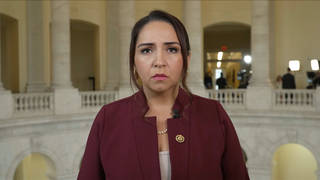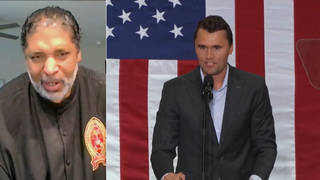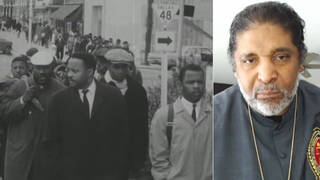
Guests
- Charlie Savagewinner of the 2007 Pulitzer Prize for National Reporting. Savage covers national legal affairs for The Boston Globe. He is the author of Takeover: The Return of the Imperial Presidency and the Subversion of American Democracy.
The eight-member U.S. Commission on Civil Rights has long been staffed equally with members of both major political parties. Critics say Bush in effect installed a fifth and sixth Republican on the panel in December 2004 after two commissioners, both Republicans when appointed, re-registered as independents. [includes rush transcript]
Transcript
AMY GOODMAN: Newly disclosed details reveal the Bush administration used a controversial maneuver to stack the nation’s top racism and discrimination panel with conservative members. The eight-member U.S. Commission on Civil Rights has long been staffed equally with members of both major political parties. Critics say Bush in effect installed a fifth and sixth Republican on the panel in December 2004 after two commissioners, both Republican when appointed, re-registered as independents. The day before Bush made the new appointments, the Department of Justice approved the move in a memo to White House counsel Alberto Gonzales’s office.
After the changes, the agency canceled a slew of planned evaluations supported by civil rights groups, including assessing the budget for civil rights enforcement, financial aid to minorities, whether inaccurate census collection has deprived non-white areas of entitled federal spending.
We’re joined now by Charlie Savage, the national legal affairs reporter for The Boston Globe. He broke the story. Charlie is the winner of the 2007 Pulitzer Prize for National Reporting for his work on presidential signing statements. He is also author of the new book Takeover: The Return of the Imperial Presidency and the Subversion of American Democracy. Welcome to Democracy Now!, Charlie Savage.
CHARLIE SAVAGE: Thanks for having me back.
AMY GOODMAN: Can you please explain what’s happened to the U.S. Civil Rights Commission?
CHARLIE SAVAGE: Well, the U.S. Civil Rights Commission, which is a 50-year-old independent panel — it was set up by the first Civil Rights Act in 1957 since Reconstruction to go around and use its politically balanced independent powers of issuing subpoenas and holding hearings to gather facts in basically racial disputes to separate fact from fiction and make recommendations to Congress — has been tilted very strongly towards conservatives since December of 2004, when President Bush used a very controversial legal maneuver to install two new Republicans on the panel, replacing two Clinton appointees whose terms were up, even though at that point there were already four of the eight members who were appointed as Republicans and the law says that this commission cannot have more than four members of the same party.
Well, what they did was they said that two of the members who had been appointed as Republicans had re-registered as independents, including one just six weeks before this maneuver took place. And then they went to the Justice Department’s Office of Legal Counsel, which is that same office which has produced so many controversial opinions telling the president he has the power to torture, despite a law that says he can’t, or to wiretap without warrants, despite a law that says — appears to say he can’t. And the Office of Legal Counsel in this case said: feel free to appoint more Republicans; these people no longer count towards that party cap. And so, President Bush did appoint two more Republicans, creating a six-two conservative faction on the commission. And since then, as you’ve said, its behavior has changed dramatically.
I do want to say one thing quickly. Previous presidents have tilted this panel towards their ideological worldview in a less aggressive way, both at the end of the Clinton administration for liberals and at the end of the Reagan/Bush years for conservatives. Presidents would sometimes appoint four members of their own party and two independents who happen to share their worldview. So what this is is it’s an escalation of hardball politics, and it’s one that pushes a lot closer to the line of what is and is not legal.
AMY GOODMAN: Can you explain now what the commission is doing and what it’s not doing, especially as the balance changed of the parties?
CHARLIE SAVAGE: Well, it’s focused most of its efforts since this change on policing programs that were set up to combat the historic effects of discrimination — for example, taking a hard look at affirmative action admissions policies at law schools, looking at school integration programs that are designed to create diversity in elementary and secondary schools and concluding that there’s really no benefit to that, calling on the government to move much more aggressively to get rid of programs that help minority-owned businesses get a share of government contracts.
And at the same time it’s putting all of its energies into that, it’s not holding hearings anymore. It’s only holding short briefings in Washington. It used to go out once a year and hold full hearings somewhere in the country investigating things. It’s not issued a single subpoena, which is its main power, since this has taken place. And it’s stayed out of some of the most murky disputes involving claims of civil rights violations and racial discrimination that have cropped up since this power change happened. You know, the core mission of this panel is to go investigate things that have racial overtones and separate fact from fiction so we can have a better sense of what’s going on.
They went down to Florida after the 2000 election and held 30 hours of hearings in which they took testimony from black voters who were supposed to be eligible to vote, but who said they had been turned away from the polls because of that flawed purge of the felon voter list. But they didn’t go to Ohio after the 2004 election to investigate whether there was any truth to these allegations that in black neighborhoods in big cities in Ohio, in that very close election that could have swung the election between Bush and Kerry, not enough voting machines were sent, and so the lines were around the block and people got discouraged and didn’t cast ballots. They didn’t go down to Jena, Louisiana, to figure out what really happened in that very high-profile racially charged dispute case — or assault case, I mean to say. They’ve stayed out of those things, and instead they’ve put the energies of the commission into attacking affirmative action and other race-conscious policies which are designed to foster diversity or help minorities.
AMY GOODMAN: You spoke, Charlie Savage, to Commissioner Abigail Thernstrom, who dropped her Republican registration six weeks before the Bush appointments. Explain that chronology and what she said to you.
CHARLIE SAVAGE: Well, Abigail Thernstrom was appointed as a Republican, and she switched to independent just in late October, just about six weeks before Bush was due to make these new appointments. And her switch allowed, under the administration’s legal theory, which is controversial, at least — allowed Bush to install another Republican on the panel alongside her. And she said that she switched because she decided at that point she would just be more comfortable as an independent. She had been an independent in years past, she said.
But when you look at her behavior and her — the public records about her political behavior, she had been a very solid Republican in the years leading up to that. She had voted in the March 2000 and the March 2004 Republican primaries. She had given $500 to the Bush-Cheney campaign in July of 2004. She had written an article in The Wall Street Journal in mid-October of 2004, just nine days before the switch, in which she called herself a Republican appointee. And she was able to really offer no ideological-change-of-heart reason for why she suddenly, abruptly, at that very key moment, decided to abandon the Republican Party. And six weeks later, six weeks after she formally renounced her ties to this party, President Bush promoted her to be vice chair of the commission. She says, however, that it had nothing to do with the commission, and she just changed on her own.
AMY GOODMAN: Gail Heriot?
CHARLIE SAVAGE: Gail Heriot is — had replaced the other Republican who had switched, a guy named Russell Redenbaugh, who switched in — who was named as a Republican but switched in the summer of 2003, because, he told me, he is a libertarian and he grew annoyed at the Republican Party’s stance on certain social issues. And he thinks it’s wrong and inappropriate that another Republican was installed in his place because he personally did that.
He later got disgusted with the commission, in general, and quit, and Senate Republicans replaced him with a woman named Gail Heriot. She’s a law professor in San Diego, very conservative, a member of the Federalist Society, had been a delegate to the 2000 Republican convention and had applied to join the state panel in California, state advisory panel for the U.S. Civil Rights Commission, calling herself a Republican in 2006. But shortly after that, in August of '06, she re-registered as an independent, and six months later Senate Republicans installed her as an independent, because there were still four Republicans officially on the panel, as a fifth conservative. She's still there now. She was just reappointed to a new six-year term yesterday as an independent. She said she just has some policy differences with the Republican Party. I asked her to name one, and she declined.
AMY GOODMAN: Charlie Savage, one question before you leave, and that is to your specialty, what you won the Pulitzer Prize for: coverage of President Bush signing these signing statements next to a bill he signs, so it means he doesn’t have to exactly follow that bill, what has become law. This is the issue of Pennsylvania Senator Arlen Specter. He was the ranking member of the Senate Judiciary Committee. He brought up the issue Tuesday during the committee’s vote to endorse the nomination of Michael Mukasey to be attorney general. This is what Arlen Specter had to say.
SEN. ARLEN SPECTER: I’m very concerned about the presidential signing statements, where we pass legislation and under the Constitution he has the authority to either veto it or sign it, and he cherrypicks. But he did it in two contexts, which were very troubling. One was, after his negotiations with Senator McCain, when we legislated on interrogation, he signed the bill and said he didn’t have to follow it. And we passed out of this committee the PATRIOT Act, passed the Congress, and we gave the FBI additional powers on the condition that we had more oversight. Then he signed the PATRIOT Act, and he said he didn’t have to abide by the conditions on oversight.
And I asked Judge Mukasey about that, and I got back an answer which is totally unsatisfactory. He said, “I agree with you that presidential signing statements should not be a vehicle for creating unnecessary confrontation.” Well, what does that mean? Is there necessary confrontation? And he says he will keep in mind the concerns when advising the President. I think the attorney general should have said, “If the president negotiates an arrangement with Congress, signs a bill, he ought to stand by it and not act to the contrary.”
AMY GOODMAN: That was Arlen Specter. Charlie Savage, your response?
CHARLIE SAVAGE: Well, Amy, I think it’s pretty clear that future Attorney General Michael Mukasey is — he may not be Alberto Gonzales, but he was selected by the Bush-Cheney legal team, and that meant that he was acceptable to them on some of the things they care about. And so, I don’t expect that we’re going to see a radical change in direction on things like: Does the president have the power to bypass laws that he says violate his unwritten inherent powers as commander-in-chief? I don’t think that we’re going to see a repudiation of signing statements. I think that we’re — you know, this is a guy who was selected because he was acceptable to that White House, and that shouldn’t be a surprise.
AMY GOODMAN: Finally, Charlie Savage, the Democrats, Schumer and Feinstein, who voted with the Republicans to confirm Michael Mukasey as attorney general, said all they have to do is pass a law against waterboarding. If they pass that law, one, President Bush could veto it, right? But he could also sign that law, but then sign a signing statement; isn’t that true?
CHARLIE SAVAGE: Well, he could certainly — I mean, he’s done that in the past on other laws, and so it wouldn’t be a surprise if he did. I think he would just probably veto it. He seems to be suddenly much more interested in vetoing things than he used to be.
AMY GOODMAN: Well, Charlie Savage, I want to thank you for being with us, author of the book Takeover: The Return of the Imperial Presidency and the Subversion of American Democracy, Pulitzer Prize-winning journalist with The Boston Globe.
CHARLIE SAVAGE: Thanks for having me.











Media Options